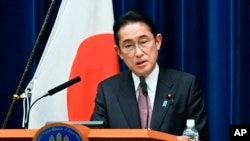Japanese Prime Minister Fumio Kishida begins a weeklong trip Monday to strengthen military ties with Europe and Britain and bring into focus the Japan-U.S. alliance at a summit in Washington, as Japan breaks from its postwar restraint to take on more offensive roles with an eye toward China.
Kishida's talks with U.S. President Joe Biden on Friday will highlight his five-nation tour that also takes him to France, Italy, Britain and Canada — some of the Group of Seven nations Japan has stepped up defense ties with in recent years. His first stop is Paris on Monday evening.
Kishida said his summit with Biden will underscore the strength of the Japan-U.S. alliance and how the two countries can work more closely under Japan's new security and defense strategies.
Japan in December adopted key security and defense reforms, including a counterstrike capability that makes a break from the country's exclusively self-defense-only postwar principle. Japan says the current deployment of missile interceptors is insufficient to defend it from rapid weapons advancement in China and North Korea.
Kishida said he will explain to Biden the new strategy, under which Japan is also reinforcing defenses on its southwestern islands close to Taiwan, including Yonaguni and Ishigaki, where new bases are being constructed.
"Will will discuss further strengthening of the Japan-U.S. alliance, and how we work together to achieve a fee and open Indo-Pacific," Kishida told a NHK national television talk show Sunday, referring to a vision of national and economic security cooperation the two countries promote to counter China's growing military and economic influence.
Under the new strategies, Japan plans to start deploying in 2026 long-range cruise missiles that can reach potential targets in China, nearly double its defense budget within five years to a NATO standard of about 2% of GDP from the current 1%, and improve cyberspace and intelligence capabilities.
The idea is to do as much as possible in a short time as some experts see growing risks that Chinese President Xi Jinping may take action against self-ruled Taiwan, which Beijing claims as part of its territory.
Japan's new strategy has been well received by the Biden administration and some members of the Congress. Experts say it would also widen cooperation with their main regional partners Australia and possibly South Korea.
"This is an opportunity to rethink and update the structure and the mechanisms of the alliance to reflect a much more capable partner that's coming," said Christopher Johnstone, senior adviser and Japan chair for the Center for Strategic and International Studies.
He said, however, that Japan's focus on the strike capability and budget is a welcome but "a daunting agenda" that will require a lot of cooperation with the United States.
Paving the way for the summit, Japanese Defense Minister Yasukazu Hamada and Foreign Minister Yoshimasa Hayashi will fly to Washington to meet their American counterparts, Lloyd Austin and Antony Blinken, respectively, on Wednesday, followed by separate defense ministers' talks on Thursday.
The Biden administration, which also adopted its security strategy in October, expects Japan to assist in the supply and storage of fuel and munitions in case of a Taiwan emergency, experts say. Japan and the United States are also reportedly considering establishing a joint command.
During the talks at the White House, the two leaders are also expected to discuss China, North Korea's nuclear and missile development as well as Russia's war on Ukraine, Japanese officials said.
Cooperation in the area of supply chain and economic security will be also on the table. Last week, Japanese Economy and Industry Minister Yasutoshi Nishimura and U.S. Secretary of Commerce Gina Raimondo discussed in Washington the importance to work together to promote and protect critical and emerging technologies, including semiconductors, and export controls to address competitiveness and security concerns.
During his trip, Kishida will seek to further strengthen bilateral military ties with four other countries, Japanese officials say.
Japan's joint development and production of its F-X next-generation fighter jet with Britain and Italy for a planned deployment in 2035 will be a top agenda item during his visits in Rome and London on Tuesday and Wednesday.
Japan and Britain have also been discussing a Reciprocal Access Agreement that would remove obstacles to holding joint military exercises in either country. Besides the Japan-U.S. security treaty that allows U.S. troops to station in Japan, Tokyo has a similar agreement only with Australia, and Britain would be second.
During his talks with French President Emmanuel Macron, Kishida is expected to share concern over China's growing activity in the South Pacific and confirm stepping up joint military exercise between the two sides.







